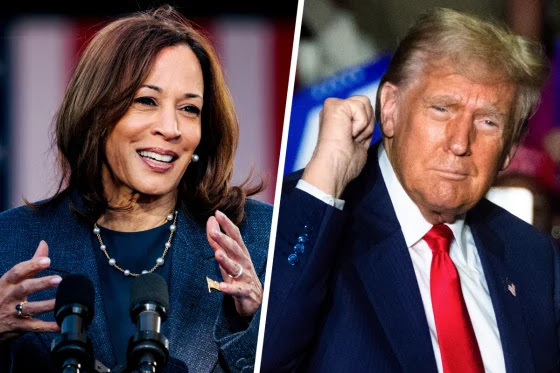Voters who do not affiliate with either of the two major parties have supported the victor in nine of the last twelve presidential races, including both campaigns in which Donald Trump was on the ballot. In the final minutes of the 2024 presidential race, unaffiliated voters appear to be drifting toward Kamala Harris.
That’s what helps to explain the surprising shift among Iowa voters in Harris’s favor, according to Ann Selzer’s latest survey for the Des Moines Register. And that does constitute a change in the nature of the race. “Independent likely voters, who have supported Trump in every other Iowa Poll this year, now favor Harris, 46% to 39%,” the DMR write-up of the survey revealed. “Now, independent women choose Harris over Trump 57% to 29%. That’s up from September, when independent women gave her just a 5-point lead, 40% to 35%.”
It’s easy to dismiss Selzer’s survey as an outlier, which would not be to pass judgment on this poll or its methodology. Aberrations happen, and good pollsters don’t try to massage their data so that it aligns with expectations. But Selzer’s polls receive outsized attention from political observers for good reasons. Since 2012, her final surveys have come in within three points of the eventual result, and her polls in 2016 and 2020 proved to be leading indicators of Donald Trump’s otherwise unseen strength among white voters. Today, her survey identifies a shift among women, “particularly those who are older or are politically independent,” sufficient to give Harris a prohibitive boost. That phenomenon may not be limited to the confines of Iowa’s borders.
Selzer isn’t the only pollster to register this shift among independents. The final NBC News poll of the presidential race found Trump and Harris deadlocked nationally at 49 percent apiece. And yet, that poll also showed Harris maintaining an eight-point advantage over Trump among independents (51 to 43 percent). In the NBC News poll conducted between October 4 and 8, by contrast, the split among independent voters was a statistically insignificant 44 to 40 percent favoring Harris. “Compared to other groups, there are more independents who have yet to choose between Harris and Trump — or who say they don’t want to pick either of them,” NBC’s write-up observed at the time.
ABC News polling director Gary Langer seems to be seeing something similar. In the last pre-election ABC News/Ipsos survey, independents are breaking for Harris by five points at 49 to 44 percent — within the margin of error for that small subgroup. But Harris maintains a larger advantage among independent women (55 to 37 percent) compared with Trump’s support from independent men (49 to 45 percent). Harris had a scant one-point advantage among independents in that survey’s last outing after slipping substantially with this coveted demographic in the months that followed the Democratic Party’s nominating convention.
Pollsters seem to be experiencing a sudden onrush of enthusiasm for Harris all at once, and they’re scared of it. “It seems clear now that we are under-sampling women, African Americans, and the City of Detroit based on absentee ballot returns and early voting,” one Michigan-based pollster confessed. The realization came too late to adjust the survey’s methodology, but it would explain where the miss came from — if, indeed, there is a miss in the offing.
As Nate Cohn ominously explained in his analysis of the final New York Times/Siena survey of swing states, “white Democrats were 16 percent likelier to respond than white Republicans.” That raises the possibility that the same non-response problems that marred 2016 and 2020 are still corrupting the data. “We do a lot to account for this,” he assured his readers, “but in the end there are no guarantees.”
It could all be noise — a World War Z–style surge of angry center-left women bum-rushing the pollsters and overwhelming their defenses, coupled with the known but intractable systematic problems associated with contacting voters who only turn out when Trump is on the ballot. But if it’s not noise, we wouldn’t have to overthink the sudden burst of enthusiasm among the former president’s opponents. Trump spent the final week of his campaign doing all that he could to alienate persuadable women voters.
At his notoriously freewheeling rallies, Trump mused about how his “people” told him that he should not frame his desire to shield women from “imported criminal migrants” as wanting to “protect” women, which is exactly why he said it anyway. “I said, ‘Well, I’m going to do it, whether the women like it or not, I’m going to protect them,’” Trump said in remarks Democrats have publicized. “I shouldn’t have left, I mean, honestly,” Trump said of the Oval Office while musing about how his tenure in the White House ended, a casual reminder for voters who might have forgotten his conduct between the election and January 6, 2021. He appeared to welcome the allegation promoted by one of his supporters that Kamala Harris was a prostitute. “Just remember, other people said it, not me,” he grinned.
If the former president had calibrated his conduct to activate as many anti-Trump women as possible, it’s not clear what he would have done differently. That indecorous behavior might have contributed to increased intensity among persuadable women in opposition to his candidacy. We’ll know whether that is enough to cost him the presidency soon enough.

















